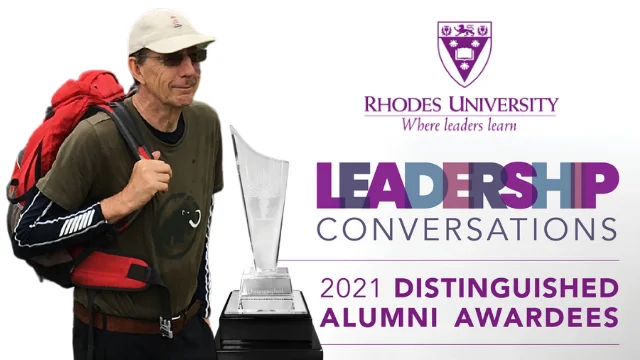
By Zindzi Nkunzi
Rhodes University hosted its fourth and final Leadership Conversation for the year, with its 2021 Distinguished Alumni Award recipient, Dr Roger Scoon, on 30 November 2021.
The Distinguished Alumni Award recognises old Rhodians who embody Rhodes University’s motto “where leaders learn” and have made a significant contribution to society, the University, and their professional fields.
Rhodes University Vice-Chancellor Dr Sizwe Mabizela extended a heartfelt congratulatory message to Scoon: “The award recognises the recipient as an outstanding role model for current and future generations of Rhodes University students.”
Dr Mabizela further expressed that Scoon has distinguished himself as a world authority on the Bushveld Complex of South Africa through his outstanding research in Geology.
As someone closely associated with the awardee, Dr Andrew Mitchell found honour and privilege in reading Scoon’s citation, which outlined his upbringing, educational background, profession, and most significant contributions.
Scoon is an independent researcher, author and internationally recognised authority on the platinum, chromium, and vanadium of the Bushveld Complex of South Africa and its contained ore.
In an insightful and fascinating discussion with Associate Professor of Geochemistry and Petrology at Rhodes University, Professor Steve Prevec, Scoon reflected on the geoheritage of South Africa and the national parks in East Africa.
Regarding the Eastern Limb of the Bushveld Complex, Professor Prevec provided a brief introduction as context for Scoon’s contributions to its geological research. “Geology is fundamentally the study of how the earth works based on the evidence preserved in rocks,” he said.
Most of the rocks geologists’ study are exposed at the surface – they are visible. Geologists can extrapolate an enormous amount of information about how those rocks formed through observation and analysis. “Where they came from; how they got there; when they formed; and how this influenced other aspects of the earth surface, such as climate and many other factors,” Professor Prevec said. As a travelling geologist, Scoon suggested that people accept that the earth is constantly changing.
Additionally, Professor Prevec shared that geoheritage has been on the map of the South African geological community for a long time. Domestic publications such as the Geobulletin provide forums for the sharing and promotion of geological heritage. Professor Prevec believes that recognising the passion and dedication of individuals who are invested in the concept of geoheritage and are willing to commit to such causes is central to the development of geoheritage programmes.
“No geoheritage programmes would have succeeded without dedicated individuals,” he said. He then added that the Bushveld Complex had been a topic of interest for Scoon for years.
Scoon thanked those who saw him worthy of the award and said: “Rhodes University has played a huge part in my life. I’ve been fortunate to have worked with Professor Hugh Eales, an internationally-recognised scientist who led the Geology department for many years.”
Reflecting on his geoheritage journey and the contributions he has made in geological research, he humbly acknowledged other geologists, as “part of geoheritage is recognising the contributions of the individuals”.
While speaking about the work he has been involved in, he suggested possible ways to help promote and grow geoheritage in South Africa because “we are lagging behind”. He proposed that government becomes more involved and establishes “geoparks”. “Geoparks can generate a lot of tourism into the country,” he said.
Scoon discussed how one of his most successful exploration projects led to the establishment of the Marula Platinum Mine on the Winnaarshoek. He has retained a close relationship with Impala Platinum, the operator of the mine. He continues to undertake geological research projects at Winnaarshoek, with drill core samples provided to staff and students at Rhodes University.
Finally, Scoon acknowledged the work he has done on the Bushveld Complex of South Africa. “The Bushveld is just the most remarkable geological phenomenon on earth. I felt very privileged to be allowed to work on it for so long,” he concluded.

